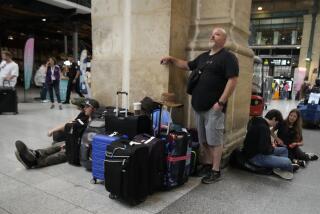250,000 London Commuters Delayed as Bomb Stalls Trains
- Share via
LONDON — The British capital was plunged into chaos Monday after a bomb threat and subsequent explosion caused authorities to shut all commuter railway stations, a disruption that officials estimated would cost recession-hit businesses here more than $80 million.
An estimated 250,000 commuters were unable to get into the city Monday after a bomb went off about 6 a.m. on the tracks near Clapham Junction station, the city’s busiest rail intersection. A telephoned bomb threat 20 minutes earlier had prompted authorities to order all stations closed while a search was undertaken.
Train services were tied up for about five hours during the search. No other bombs were found.
Many potential Christmas shoppers gave up planned trips into the city when the news was broadcast that all stations were closed.
In some central London offices, only a third of the working staff showed up. The Assn. of London Authorities estimated that half of the city’s 500,000 daily train commuters did not get to work.
The caller who telephoned the threat to a television station claimed to represent the Irish Republican Army, blamed by police for the blast. The episode exposed the vulnerability of London’s commuter network to terrorism.
“London is the biggest soft target in the world,” declared Ivor Stanbrook, a Conservative member of Parliament, “and it is intolerable that the IRA can hold the capital to ransom in this way.”
The decision to shut down rail service while a search was undertaken for bombs underscored the dilemma confronting city authorities when faced with such threats. They could ignore the general warning and risk another incident such as the one at Victoria Station last February, when one man was killed and 38 people were injured when the terminal stayed open during a similar alert.
Or authorities can close all stations to ensure passenger safety, accepting the fact that their decisions will cause massive disruptions, as occurred Monday.
“This is a great dilemma,” a police spokesman said. “If we don’t shut down stations, and there is an explosion, then we could be accused of not reacting correctly. But if we order a closure--and nothing is found--then we totally disrupt London.”
More to Read
Sign up for Essential California
The most important California stories and recommendations in your inbox every morning.
You may occasionally receive promotional content from the Los Angeles Times.










